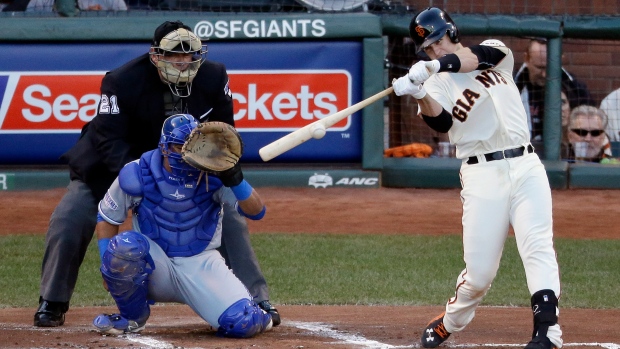Oct 30, 2014
Naylor: Baseball needs to find a way to shorten games
No one wants to see a clock in baseball but horrendous TV ratings for this World Series will be the catalyst to bring change. As Dave Naylor of TSN Radio 1050 writes, baseball needs to adapt and understand that, in this day and age, less is more.
By Dave Naylor

Perhaps you saw the final out of the World Series Wednesday night when San Francisco defeated Kansas City by a 3-2 score in Game 7 to win their third title in five years.
Or perhaps, like a lot of people, you went to bed before it was over.
That's because the game was not just the seventh game of the series. It was the seventh game of the series that eclipsed the three-hour mark.
And while three-hour baseball games aren't at all unusual these days, they shouldn't be the rule. Especially not in a 3-2 game where there was just one run scored after the second inning... and exactly three hits – combined – after the fourth.
By comparison, the 1985 World Series, which also involved the Kansas City Royals in a seven-game series, had not a single game that eclipsed the three-hour mark.
But in today's age, where highlights and information are available to everyone, where our phones are going off at all hours of the day and evening and demands of the workplace and life in general seem limitless, there's no way the average post-season baseball game should be three-and-a-half hours.
There's a reason things like Twitter have taken off in this day and age... because it gives us what we want instantly. Baseball needs to take a lesson from the world of 140 characters.
Another comparison, if you will.
San Francisco's Game 1 win over Kansas City featured just 14 hits and seven walks. There were just three runs scored by both teams after the fourth inning and, of the five pitching changes, only two occurred in the middle of an inning. The game took three hours and 32 minutes.
Game 1 of the 1985 series had one more hit and the same number of walks as this year's opener between the Royals and Giants, but somehow managed to wrap-up in 44 minutes less.
None of this should come as a surprise since this past season, the average length of a major league game crossed the three-hour mark for the very first time.
It's one thing to ask football fans to invest three-plus hours per week to follow their favourite team. But since Major League Baseball teams play six or seven games per week, shorter games are a must.
One of the beautiful things about baseball has been its timelessness, the idea that the length of a game in time is completely subject to what occurs in it. But the problem is not that extraordinary baseball games are taking a long time to play, it's that dead-ordinary games have turned into marathons as well.
Some of the lengthening of baseball games comes from changes in tactics, such as the frequency of managers changing pitchers or the tendency of hitters to take more pitches, especially at the start of a count.
And then there are the advertisements, as in more of them, which are contributing to the mess.
In fact, if you want to see a window into baseball's future, don't look at the World Series. Look at what's happening right now in the Arizona Fall League, which is being used as a laboratory for ways to shorten the length of games.
That's where they are setting time limits between pitches, between innings and for pitching changes. Batters are required to keep a foot in the batters box between pitches, and the occurrence of intentional walks happens automatically.
No one wants to see a clock in baseball but horrendous TV ratings for this World Series will be the catalyst to bring change.
Because baseball needs to adapt and understand that, when you're competing for people's attention in this day and age, less is more.

